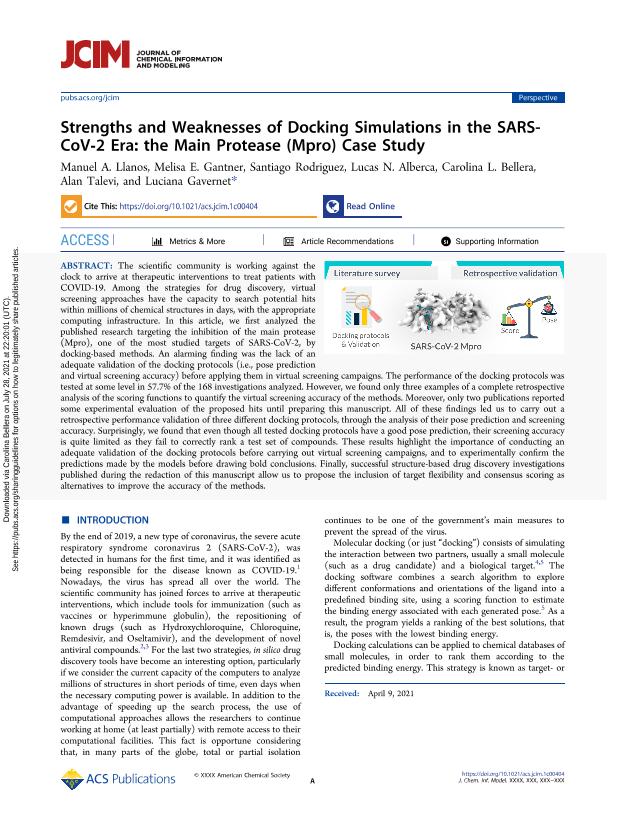Artículo
Strengths and Weaknesses of Docking Simulations in the SARS-CoV-2 Era: The Main Protease (Mpro) Case Study
Llanos, Manuel ; Gantner, Melisa Edith
; Gantner, Melisa Edith ; Rodríguez, Santiago
; Rodríguez, Santiago ; Alberca, Lucas Nicolás
; Alberca, Lucas Nicolás ; Bellera, Carolina Leticia
; Bellera, Carolina Leticia ; Talevi, Alan
; Talevi, Alan ; Gavernet, Luciana
; Gavernet, Luciana
 ; Gantner, Melisa Edith
; Gantner, Melisa Edith ; Rodríguez, Santiago
; Rodríguez, Santiago ; Alberca, Lucas Nicolás
; Alberca, Lucas Nicolás ; Bellera, Carolina Leticia
; Bellera, Carolina Leticia ; Talevi, Alan
; Talevi, Alan ; Gavernet, Luciana
; Gavernet, Luciana
Fecha de publicación:
07/2021
Editorial:
American Chemical Society
Revista:
Journal of Chemical Information and Modeling
ISSN:
1549-9596
Idioma:
Inglés
Tipo de recurso:
Artículo publicado
Clasificación temática:
Resumen
The scientific community is working against the clock to arrive at therapeutic interventions to treat patients with COVID-19. Among the strategies for drug discovery, virtual screening approaches have the capacity to search potential hits within millions of chemical structures in days, with the appropriate computing infrastructure. In this article, we first analyzed the published research targeting the inhibition of the main protease (Mpro), one of the most studied targets of SARS-CoV-2, by docking-based methods. An alarming finding was the lack of an adequate validation of the docking protocols (i.e., pose prediction and virtual screening accuracy) before applying them in virtual screening campaigns. The performance of the docking protocols was tested at some level in 57.7% of the 168 investigations analyzed. However, we found only three examples of a complete retrospective analysis of the scoring functions to quantify the virtual screening accuracy of the methods. Moreover, only two publications reported some experimental evaluation of the proposed hits until preparing this manuscript. All of these findings led us to carry out a retrospective performance validation of three different docking protocols, through the analysis of their pose prediction and screening accuracy. Surprisingly, we found that even though all tested docking protocols have a good pose prediction, their screening accuracy is quite limited as they fail to correctly rank a test set of compounds. These results highlight the importance of conducting an adequate validation of the docking protocols before carrying out virtual screening campaigns, and to experimentally confirm the predictions made by the models before drawing bold conclusions. Finally, successful structure-based drug discovery investigations published during the redaction of this manuscript allow us to propose the inclusion of target flexibility and consensus scoring as alternatives to improve the accuracy of the methods.
Palabras clave:
Docking
,
MPro
,
COVID-19
,
Virtual screening
Archivos asociados
Licencia
Identificadores
Colecciones
Articulos(CCT - LA PLATA)
Articulos de CTRO.CIENTIFICO TECNOL.CONICET - LA PLATA
Articulos de CTRO.CIENTIFICO TECNOL.CONICET - LA PLATA
Articulos(INGEBI)
Articulos de INST.DE INVEST.EN ING.GENETICA Y BIOL.MOLECULAR "DR. HECTOR N TORRES"
Articulos de INST.DE INVEST.EN ING.GENETICA Y BIOL.MOLECULAR "DR. HECTOR N TORRES"
Articulos(INIBIOLP)
Articulos de INST.DE INVEST.BIOQUIMICAS DE LA PLATA
Articulos de INST.DE INVEST.BIOQUIMICAS DE LA PLATA
Citación
Llanos, Manuel; Gantner, Melisa Edith; Rodríguez, Santiago; Alberca, Lucas Nicolás; Bellera, Carolina Leticia; et al.; Strengths and Weaknesses of Docking Simulations in the SARS-CoV-2 Era: The Main Protease (Mpro) Case Study; American Chemical Society; Journal of Chemical Information and Modeling; 61; 8; 7-2021; 3758-3770
Compartir
Altmétricas



